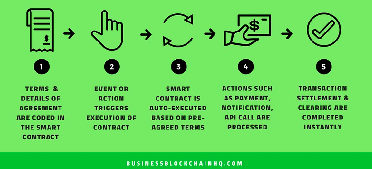 If you are involved with Blockchain technology, it is not long before the subject of Smart Contracts arises.
If you are involved with Blockchain technology, it is not long before the subject of Smart Contracts arises. Smart Contracts was a term Nick Szabo was talking about in 1997, and he described them the following way: “Smart Contracts utilize protocols and user interfaces to facilitate all steps of the contracting process. This gives us new ways to formalize and secure digital relationships which are far more functional than their inanimate paper-based ancestors”.
A more simplistic way to explain Smart Contracts is to think of them as an algorithm. For example, if the plane is late, then there is pay compensation, if it is on time, no compensation is due.
As the diagram above illustrates, essentially Smart Contracts are able to digitise agreements. After all, Smart Contracts are, in effect, a software that automatically executes instructions without the need for any human interaction. Smart Contracts have their contractual terms encoded in computer language, instead of the legal language that you would find in a standard contract. Many lawyers will readily tell you that ‘Smart Contracts are not smart, nor are they contracts!’ Indeed, Nobel prize winner for economics in 2016, Oliver Hart, who won his award for the work he had done on contract theory, has recently claimed that Smart Contracts “are quite convenient, taking into consideration the fact that they are automatically executed”. He goes on to state that “their basic outlines suggest that the contracts are not a cure or solution for all issues plaguing the crypto verse… but contracts do not address conditions or problems where a smart contract may have been drawn out to cover a long-term situation”. However, we do need to take Hart’s comments with caution as he admitted he, himself, knew very little about smart contracts, or Blockchain, from a practical point of view!
These mixed views on Smart Contracts have not stopped Gartner from predicting that, by just 2020, autonomous software (not reliant on any human interaction) will account for 5% of economic transactions. As we see the global economy increasingly become more digitised (i.e devices using technology like Internet of Things (IoT) and Blockchains that can execute Smart Contracts) the challenges, as well as the opportunities that Smart Contracts present, will no doubt be tested in courts across the world.


